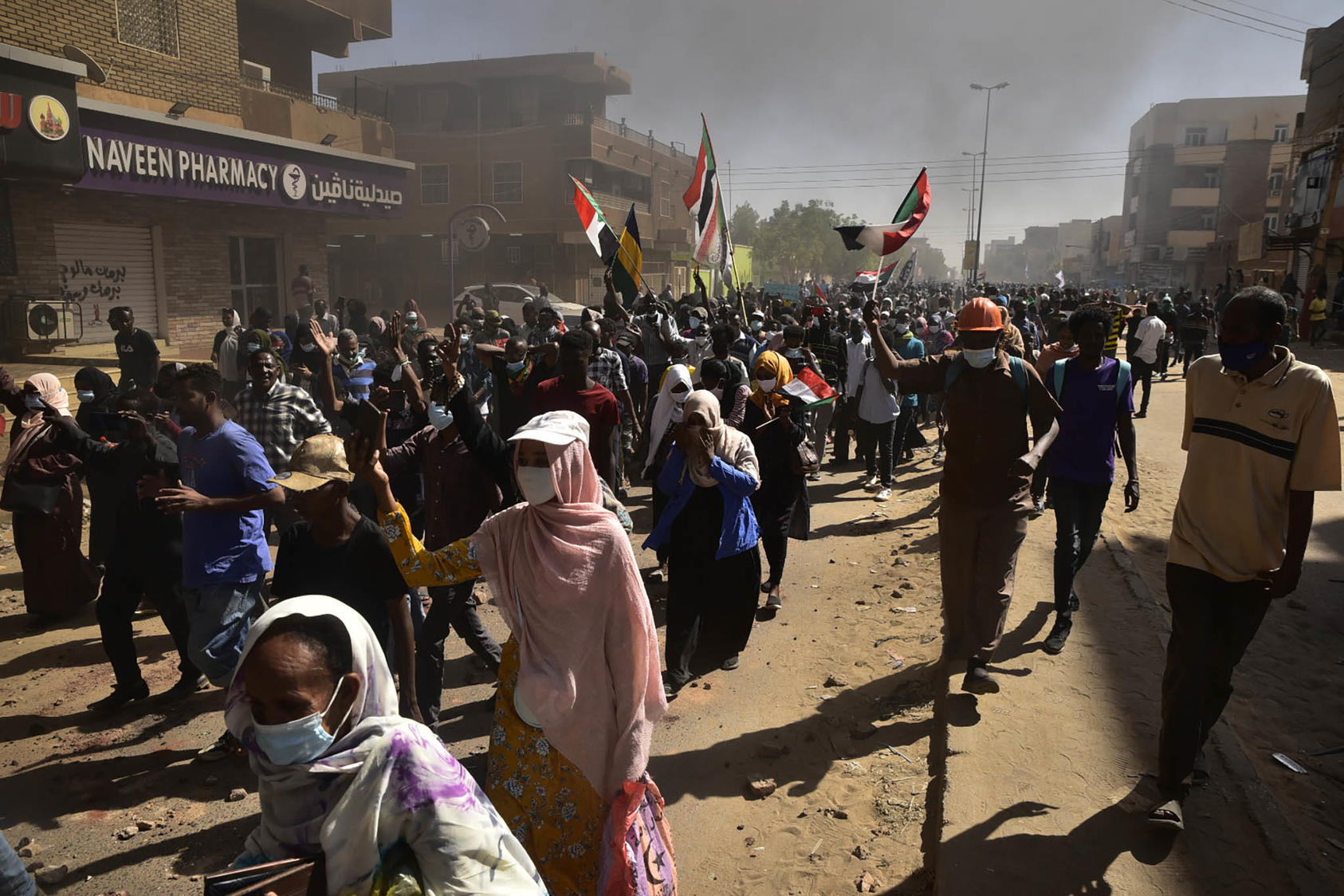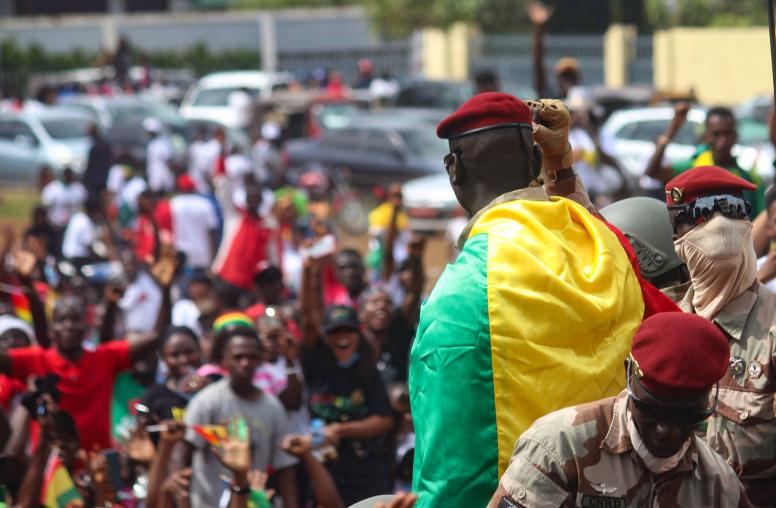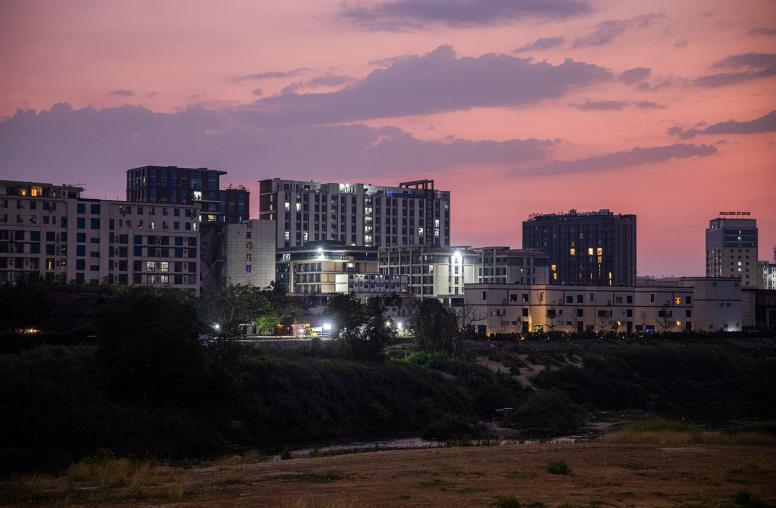U.S. and African Leaders Need to Focus on Democratization
This month’s summit conference can help reverse recent years’ setbacks to democracy in Africa.
The U.S. government is gathering this month’s second U.S.-Africa Leaders Summit not least because the swiftly rising challenges of the 21st century are pushing Africa squarely to the center of global and U.S. interests. Managing increased violent conflict, climate degradation and human displacement all depend on a better U.S.-African partnership, one that shares an interest in strengthening the democratic rule of law within and among nations. Democracy has eroded, globally and in Africa, since the first U.S.-Africa summit eight years ago — but this month’s conference can reverse that pattern, say two USIP experts, both former ambassadors in Africa.

Democracy’s Erosions Include Africa
Since 2014’s first U.S.-Africa Leaders Summit, indicators of the state of democracy show it highly fluid in Africa — and troubled in the most recent years. African peoples’ persistent demand for democracy has won advances, such as Zambia’s peaceful election and transfer of power 16 months ago, and Kenya’s hotly contested but peaceful election in August, its results accepted partly because of increased transparency in the counting of votes. Sudan’s grassroots pro-democracy movement continues to show remarkable resilience in its campaign for a transition from military to elected civilian rule.
Yet the wider recent pattern more often has been of setbacks — notably seven military coups over 26 months. Twenty years after Africa’s hopeful democratic advances following the Cold War’s end, leaders in 16 African countries have weakened or scrapped constitutional term limits for presidents — a pattern that has helped undermine governments’ legitimacy and open paths to coups. Some governments exploited the COVID pandemic to constrict citizens’ rights and consolidate their power.
International indices reinforce both democracy’s fluidity and setbacks in Africa. The Economist Intelligence Unit’s annual Democracy Index showed overall declines of democracy in Africa (as in the United States and European nations) in the past few years, following years of advances roughly a decade ago. Freedom House’s latest annual Freedom in the World report notes “16 consecutive years of decline in global freedom.” Last year’s setbacks include new restrictions on news media in North Africa and on freedom of assembly in Senegal, and social media shutdowns in at least 10 African countries. The Africa-based Ibrahim Index of African Governance measures not overall “democracy” but an adjacent quality — governments’ performance in meeting public needs for security, basic rights, economic opportunity and social essentials (such as health and education). That index recently increased the role of citizens’ perceptions in its measurements and, like the other databases, it registered a significant decline in effective governance in Africa as of 2019, following years of improvement.
West Africa has been a regional focal point. The spreading violence and instability in the Sahel region, particularly in its west, has displaced 2.5 million people over 10 years, and threatens to intersect dangerously with erosions of governance and democracy in the vastly more populous coastal region. A USIP’s Senior Study Group on Coastal West Africa this year “identified improvements in governance as vital to peace and stability” — and thus to any advance of democracy. The U.S. government includes five coastal West African states among nine worldwide where it has set a priority on implementing its new strategy mandated by the 2019 Global Fragility Act.
The work of peacebuilding, so interwoven with democratization, sees an imperative to build a U.S.-African partnership that can advance both processes. Peacebuilding’s approach requires, among other things, the listenership and humility to acknowledge that the need to strengthen democracy is universal, applying to Americans as well as our partners. It acknowledges that, to help global governance and stability, a partnership also must address democratization and inclusion of Africa, like other parts of the Global South, in our international institutions of governance, such as the U.N. Security Council and International Monetary Fund.
This summit conference and U.S. efforts generally should strengthen two lines of effort to promote democratization. These aim to improve the quality of governance and increase the trade and investment required to expand economies, writes USIP’s Ambassador Terence McCulley:
Greater trade and investment are essential because every African government faces the imperative of vastly expanding jobs and opportunities for the demographic tsunami of a burgeoning youth population. Failure risks broad social instability. The United States has been talking about trade and investment for more than 20 years, with the African Growth and Opportunity Act offering unparalleled access for African countries to the U.S. market, and other U.S. government initiatives to encourage American businesses to contribute to the growth of African economies. Improved economic prospects can promote peace, stability and democracy in African states, and a more robust U.S.-Africa trade relationship creates jobs and greater prosperity back home, because companies that export tend to pay higher wages.
For over a decade, we’ve been talking about disloyal competition from world powers such like China that don’t respect the same rules that U.S. and European companies must observe. Latterly we have seen the malign influence of disinformation campaigns launched by Russia across the continent. But I think we also need to recognize how U.S. companies are often disadvantaged by “loyal competition” from friends, such as France, the Netherlands and Germany, whose development finance institutions are more closely lashed to their foreign policy agendas. The United States has powerful and effective tools at its disposal. These include the Millennium Challenge Corporation, U.S. Trade and Development Agency, U.S. Agency for International Development and U.S. International Development Finance Corporation (DFC). The Millennium Challenge Corporation in particular has clear governance, human rights and social sector investment criteria that guide its investment decisions, as do the other arms of U.S. development assistance. The DFC (established in 2019 as the successor to the Overseas Private Investment Corporation) is building out its portfolio in Africa. As it does, we need to ensure that it acts in robust support of U.S. companies as they seek opportunities in Africa and that DFC investments advance our democracy and governance agenda on the continent. Increased trade and investment will help fuel the growth of African economies, create better trading partners and promote stability and democracy, demonstrating true U.S. partnership as Africans move to make the African Continental Free Trade Area operational and realize the ambitious goals of African Union’s Agenda 2063.
Another important U.S. focus must be to keep promotion of good governance at the heart of our Africa policy. The United States has a strong record of supporting credible and transparent elections, but building democracy requires sustained engagement beyond the electoral cycle, including supporting the efforts of our African partners to strengthen and reinforce the social compact between government and the governed. Fundamentally, good governance is about demonstrating relevance to a country’s citizenry. Governments do this by delivering essential services, including health care, education, infrastructure and clean water, and through accountable security services that afford protection for civilians while respecting human rights. Our development programs have focused on these elements, but we must continue to make this central to our engagement with our African partners. The new U.S. Strategy to Prevent Conflict and Promote Stability is a laudable effort to promote an American whole-of-government response to the governance and security gaps that create instability in Africa. It is urgent that we deploy this strategy quickly. We see that urgency across the northern parts of coastal West Africa, for example. There, marginalized communities have been excluded from economic growth and opportunity, making these groups at once vulnerable to cross-border attacks by extremist movements from the Sahel, recruitment by foreign extremists, and the rise of domestic extremism because frustrated young people lack other opportunities.
When I was ambassador in Nigeria [from 2010 to 2013], Boko Haram was flourishing in the northeast not because people in Borno State were somehow inclined to that group’s extremist ideology — but rather because Boko Haram floated in a sea of indifference since local populations did not view Nigeria’s national government as a protecting force invested in the region’s development. It had been 10 years since any senior national official had even visited the state, and people didn’t see the federal government as relevant in their lives. People lacked confidence in the security forces, fearing that if they even went to a police station to report Boko Haram activities, they risked being beaten and arrested themselves as collaborators. As partners in development, we need to help reverse such dynamics. Effective, accountable governance that helps people fulfill their needs is what will also help them feel invested in democracy.
The historical and thematic contexts of this month’s U.S.-Africa Leaders Summit underscore an imperative for partnership, writes USIP’s Ambassador Makila James:
The Biden administration’s Strategy Toward Sub-Saharan Africa has put an emphasis on “refram[ing] the region’s importance to U.S. national security interests” — specifically in promoting open societies, democracy dividends, economic opportunities, climate adaptation and energy justice. These are critical issues for the United States and the African continent.
The U.S.-Africa Leaders Summit is a significant demonstration of the administration’s effort to implement its strategy by engaging Africa with greater respect, partnership and a recognition, rooted in realpolitik, of Africa’s global importance. This is only the second such summit, following the conference hosted by President Obama in 2014. In the intervening eight years Africa has changed, as have U.S. priorities and the world, specifically in several areas:
- democratic retreat, visible in Russia’s invasion of Ukraine and a return to military coups;
- global power competition, notably including China’s rapidly growing engagements in Africa;
- spread of violent jihadist organizations across the Sahel and other regions; and
- urgent threats from climate change.
Other critical issues driving the U.S. strategy and the summit are: Africa’s huge youth demographics, enormous voting power in multilateral fora and insistence on an energy justice agenda for responding to climate change. As well, the launch of the Africa Continental Free Trade Agreement and the growth of the middle class in Africa as an enormous economic market for U.S. goods and services have positioned Africa as central to many of the things the U.S. government seeks to accomplish globally. The summit is also about engaging with civil society on governance issues, with the private sector on greater trade and investment opportunities, and with the diaspora as a force multiplier for advancing the “shared agenda.” New areas of engagement also are promising, including the creative industry, digital technology, and a civil and commercial space forum to discuss cooperation in science.
Finally, in focusing on these issues, Americans and Africans need to change the narrative of our relations from that of a dependent and paternalistic relationship to one of shared interests and cooperation. That is what Africans are demanding in their engagement with the United States and in their own aspirational strategic plan for the 21st century — the African Union’s Agenda 2063.



